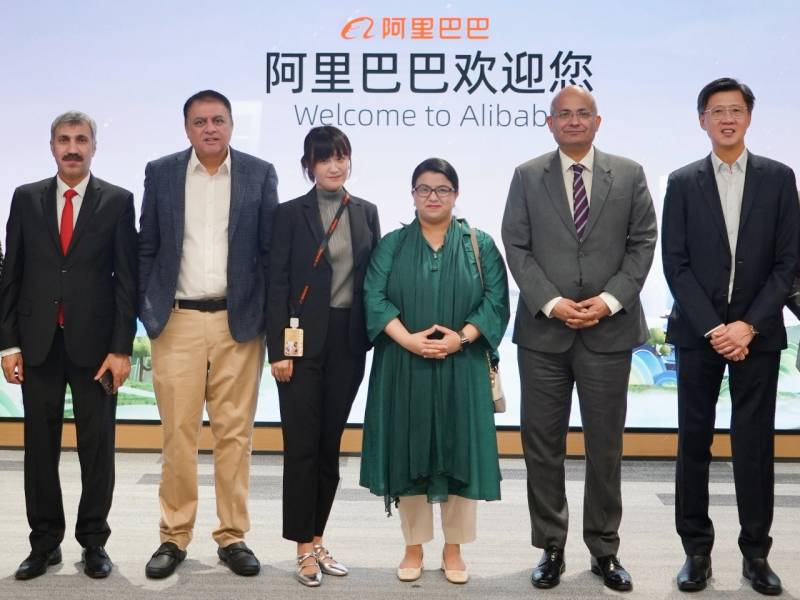In a landmark move set to transform Pakistan’s digital landscape, Alibaba.com has joined forces with the Ministry of Information Technology and Telecommunication (MoITT) through Ignite – National Technology Fund. This strategic partnership, formalized via a Memorandum of Understanding (MoU) signed in Beijing, aims to empower small and medium-sized enterprises (SMEs) and startups by integrating them into global supply chains. With a focus on e-commerce training, AI-powered tools, and export expansion, this collaboration promises to boost Pakistan’s digital economy amid a surge in new suppliers on the platform—up 60% year-on-year in Q2 2025.
The agreement includes promotional activities like trade shows and an online national pavilion, alongside Alibaba’s $1M CoCreate Pitch 2025 for global SMEs, opening doors for Pakistani entrepreneurs. As Pakistan stands on the brink of e-commerce opportunities, this partnership equips local businesses with cutting-edge resources to enhance competitiveness and foster sustainable growth in international trade.
Introduction to the Alibaba.com and Pakistan Partnership
The global e-commerce giant Alibaba.com has taken a significant step toward fostering Pakistan’s digital economy by partnering with the country’s Ministry of Information Technology and Telecommunication (MoITT). This collaboration, announced in 2025, underscores the growing importance of digital trade in emerging markets like Pakistan. With SMEs forming the backbone of Pakistan’s economy—contributing over 40% to GDP and employing millions—this partnership arrives at a crucial time when digital transformation is key to unlocking export potential.
Alibaba.com, known as a leading B2B e-commerce platform connecting millions of buyers and sellers worldwide, has a proven track record of enabling cross-border trade. By teaming up with Ignite, Pakistan’s National Technology Fund under MoITT, the initiative seeks to bridge the gap between local businesses and international markets. This isn’t just about selling products; it’s about building a robust ecosystem that includes training, technology adoption, and policy alignment to international standards.
Why does this matter? In a world where digital trade is projected to reach trillions in value by 2030, Pakistan’s youthful population—over 60% under 30—represents a powerhouse of entrepreneurial talent. However, challenges like limited access to global platforms and digital skills have hindered growth. This MoU addresses these pain points head-on, positioning Pakistan as a competitive player in sectors like apparel, sports equipment, and surgical instruments.
Details of the Memorandum of Understanding (MoU)
The MoU was signed during the 2nd Pakistan-China B2B Investment Conference in Beijing, marking a pivotal moment in bilateral relations. This agreement outlines a framework for cooperation that goes beyond mere rhetoric, focusing on actionable steps to enhance SME digital growth and export capabilities.
The Signing Ceremony and Key Attendees
The ceremony was a high-profile event attended by senior officials from both nations. On the Pakistani side, Ms. Shaza Fatima Khawaja, Minister of IT & Telecom, led the delegation, accompanied by Zarrar Hasham Khan, Secretary of IT & Telecom. Representing Alibaba.com was Mr. Roger Luo, Head of South & Southeast Asia. The presence of these leaders highlights the strategic importance of the partnership.
Following the signing, a Pakistani delegation visited the Alibaba Campus in Beijing. Hosted by Wee Choo Hua, Executive Vice President at Daraz and Lazada, and Berry Ma, Head of Pakistan Business at Alibaba.com, discussions delved into expanding Pakistan’s role in global supply chains. Topics included advanced e-commerce training for SMEs, AI integration, and digital trade facilitation—areas where Alibaba’s expertise can make a tangible difference.
Key Statements from Leaders
Leaders from both sides expressed optimism about the partnership’s impact. Ms. Shaza Fatima Khawaja emphasized Pakistan’s readiness for global e-commerce: “Pakistan is standing at the cusp of global e-commerce opportunity, where the passion and entrepreneurial acumen of our youth will enable them to showcase their abilities and products at a global level. This partnership with Alibaba.com is an important step for Pakistan’s digital economy. By equipping our SMEs and startups with advanced e-commerce tools and access to global markets, and by aligning our institutions with international best practices, we aim to foster innovation, support export growth, and strengthen Pakistan’s participation in global digital trade.”
Echoing this sentiment, Mr. Roger Luo highlighted Alibaba’s commitment: “We are pleased to partner with MoITT and Ignite to open new channels for Pakistani businesses. By combining Alibaba.com’s platform capabilities, AI-driven tools, and targeted training with government support, we can help SMEs scale, improve export competitiveness, and build sustainable digital trade pathways.”
These quotes not only reflect shared goals but also underscore the collaborative spirit driving this initiative.
Initiatives Under the MoU: Empowering Pakistani SMEs
The MoU isn’t a static document; it’s a blueprint for dynamic programs designed to propel Pakistan e-commerce forward. Alibaba.com has committed to several key activities:
- Organizing Promotional Events: This includes online and offline trade shows, as well as an online national pavilion on Alibaba.com. These platforms will showcase Pakistani products to a global audience, potentially increasing visibility and sales.
- Delivering Targeted Training: B2B e-commerce training sessions will be rolled out, focusing on best practices for international trade. Ignite will play a crucial role by identifying potential exporters and coordinating seminars in major cities like Karachi, Lahore, and Islamabad.
- Providing AI-Powered Tools: Selected SMEs and startups will gain access to Alibaba’s advanced AI tools, such as the Smart Assistant, which enhances operational efficiency and builds trust with buyers.
In addition, Ignite will promote Alibaba-led initiatives nationwide, ensuring widespread participation. This holistic approach combines technology with grassroots support, making it accessible even for smaller enterprises.
One standout feature is the launch of Alibaba.com’s $1M CoCreate Pitch 2025 for global SMEs, explicitly including Pakistani entrepreneurs. This competition offers funding and mentorship, encouraging innovation in digital trade. For Pakistani businesses, this could mean pitching ideas that leverage local strengths, such as handmade crafts or tech-enabled manufacturing, to secure investment and partnerships.
Alibaba’s Ongoing Support for Pakistani Businesses
Alibaba.com’s engagement with Pakistan predates this MoU, demonstrating a sustained commitment to the market. For instance, the platform introduced its Trade Assurance service in Pakistan, achieving an impressive 85% activation rate within months. This service protects buyers and sellers, reducing risks in international transactions and boosting confidence.
Moreover, 80% of Pakistani sellers now use Alibaba’s AI-powered Smart Assistant, which automates tasks like product recommendations and customer interactions. The results are evident: In the second quarter of 2025, Pakistan saw a 60% year-on-year increase in new suppliers on Alibaba.com. Leading categories include apparel, sports and entertainment products, and surgical instruments—sectors where Pakistan has a competitive edge due to skilled labor and cost advantages.
These statistics highlight how Alibaba’s tools are already driving growth. By integrating AI, sellers can optimize listings, predict trends, and personalize marketing, all while complying with global standards. For SMEs, this means transitioning from local markets to exporting to regions like Europe, the Middle East, and North America.
To learn more about Alibaba’s global impact, check out this authoritative report on digital trade by the World Trade Organization. Internally, if you’re interested in similar tech partnerships, read our article on “How Chinese Tech Giants are Shaping South Asian Economies.”
Future Prospects: Strengthening Pakistan’s Digital Economy
Looking ahead, this partnership could catalyze broader economic reforms in Pakistan. With the digital economy expected to contribute significantly to GDP growth—potentially adding billions through e-commerce exports—the MoU aligns with national strategies like Digital Pakistan Vision.
Key benefits for SMEs include:
- Access to Global Markets: Integration into Alibaba’s vast network of over 200 countries.
- Skill Development: Training in AI and e-commerce to upskill the workforce.
- Export Growth: Targeted support for high-potential sectors, reducing barriers like logistics and payments.
- Innovation Boost: Opportunities like the CoCreate Pitch to fund disruptive ideas.
Challenges remain, such as infrastructure gaps and digital literacy, but collaborative efforts like this address them proactively. As Pakistan’s youth harness these tools, we could see a surge in startups rivaling those in India or Southeast Asia.
In essence, this Alibaba-Pakistan alliance is more than a business deal; it’s a gateway to sustainable development, empowering entrepreneurs to compete on the world stage.
Challenges and Opportunities in Pakistan’s E-Commerce Landscape
While the partnership is promising, it’s worth acknowledging the hurdles in Pakistan’s e-commerce sector. Internet penetration stands at around 50%, and logistical issues in rural areas can impede growth. However, opportunities abound:
- Youth Demographic Advantage: With a tech-savvy young population, adoption of platforms like Alibaba.com could skyrocket.
- Sector-Specific Growth: Apparel and surgical instruments already show promise; diversifying into tech products could amplify exports.
- Policy Support: Government initiatives like tax incentives for digital exporters complement this MoU.
By leveraging AI e-commerce tools, Pakistani businesses can overcome these challenges, turning potential into profit.
Conclusion: A New Era for Global Trade in Pakistan
The Alibaba.com partnership with Pakistan’s Ministry of IT signals a transformative phase for the nation’s digital economy. From MoU-driven initiatives to AI enhancements and the $1M pitch competition, this collaboration equips SMEs with the resources needed for global success. As exports rise and innovation flourishes, Pakistan is poised to become a key player in international trade.










